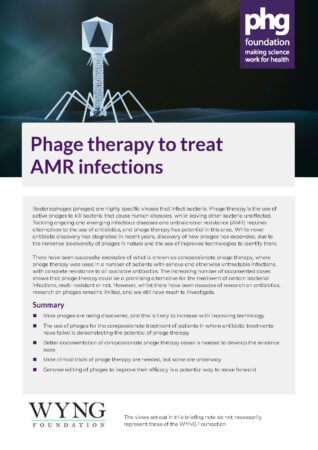The UK House of Commons Science and Technology Committee has announced a new inquiry that will explore the antimicrobial potential of bacteriophages (phages), a topic explored by the PHG Foundation in our 2021 policy briefing on phage therapy.
Phages are highly specific viruses that infect bacteria, including antimicrobial resistant (AMR) bacteria. The inquiry will investigate the barriers to the development and use of phage therapy in the UK, as well as examine the Government’s approach to the regulation, research and funding of phage therapy. This topic was submitted to the Committee’s My Science Inquiry call by Applied Microbiology International, followed by a successful pitch from Professor James Ebdon on behalf of the organisation.
AMR – the growing problem
Antimicrobial resistance is an ever increasing health threat, with an estimated 4·95 million deaths associated with bacterial AMR in 2019 alone, 12,000 of these in the UK. The problem is probably even larger than these figures suggest, as current global estimates of the burden of AMR have major knowledge gaps. There is an urgent need for detailed, reliable data on AMR to inform improved control measures, which should ideally be based on comprehensive, population-based surveillance data from low, middle and high-income countries. There is an urgent need to expand microbiology laboratory capacity and data collection systems, to improve our understanding of this important human health threat.
Phages – an alternative to traditional antibiotics?
Meanwhile, the hunt for alternative new forms of antimicrobials that could help mitigate the effects of AMR continues, with phage therapy becoming an increasingly attractive option. Whilst the discovery of novel antibiotics has stagnated, new phages with potential antimicrobial applications are continuously being identified. This is due to their immense biodiversity in nature and the use of improved technologies, such as sequencing, to identify them.
There is some real evidence of the clinical utility of phage therapy emerging, and clinical trials are under way. There have been successful case studies where phage therapy was used for the treatment of infections related to cystic fibrosis, pneumonia (including post-COVID-19 infections), as well as for infections of bones and joints, the urinary tract, implants and surgical. It has also been used against infections involving biofilms (where a community of bacteria that form a robust layer that is relatively impermeable to traditional antibiotics), leading to higher cure rates and shortened treatments. However, much of this evidence is fragmented, with better reporting and data capture needed.
Limitations
Although phage therapy has exciting potential, it is not a quick or simple solution. In the UK, and most of the world, the clinical use of phages is currently only permitted on compassionate grounds, for life-threatening conditions and where all other treatments have been exhausted. Even then, the process is slow. Phage therapies are carefully selected to match the untreatable bacterial infections. Production requires numerous steps, including collecting a patient bacterial sample, isolating the bacterium, sending it to laboratories that then test the activity of different phages to the isolate from the patient. Suitable phages identified are then produced and purified and sent to the doctors treating the patient. Prior to use, authorisation is required from regulatory bodies and local or institutional approval.
The current system for clinical use of phages, involving multiple regulatory, scientific and technical steps, is a barrier to the development of phage therapy for more widespread use.
Research directions
There have been many decades of research into traditional antibiotics, including extensive investigation into their interactions with the immune system. In contrast, phage therapy is relatively unexplored, with equivalent research yet to be undertaken. Hopefully, with further research and investigation, many of the current uncertainties around the use of phages in clinical care can be overcome. This includes optimising administration methods, doses and treatment regimes. Newer technologies such as genomic sequencing and novel assay designs could also improve and speed up identification of matches between phages and the infection-causing bacteria.
Regulatory issues
One of the other major stumbling blocks to the clinical use of phages, which will be tackled in the new Science and Technology Committee inquiry, is how phage therapy is classified for regulatory purposes. Classification across the globe varies. In the EU, phages are biological medicinal products and advanced therapy medicinal products; in the US, they are drugs, and in Poland, experimental treatments. Existing legislation is generally best suited to regulating off-the-shelf, industrially produced pharmaceuticals, rather than tailor-made phage therapies.
As outlined by Professor Ebdon, there is a need “to explore whether the regulatory authorities need to reconsider phages as a form of life that may best be handled separately from existing pharmaceutical products”. This is certainly a question that needs to be addressed to ensure suitable regulation can be implemented. Belgium has tried to tackle this by labelling them as active product ingredients, which has allowed for improved access to phages. A clearer regulatory situation would be expected to encourage more clinical trials.
As the WHO promotes the 2022 World Antimicrobial Awareness week to highlight the urgency of this issue, the potential importance of phage therapy for intervention against the most serious, life-threatening AMR infections is undeniable. The new Parliamentary scrutiny in the UK is therefore to be welcomed, and hopefully will prompt further development of the field.
Read the policy briefing: Phage therapy to treat AMR infections

